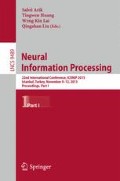Abstract
Minimal Learning Machine (MLM) is a recently proposed supervised learning algorithm with simple implementation and few hyper-parameters. Learning MLM model consists on building a linear mapping between input and output distance matrices. In this work, the standard MLM is modified to deal with missing data. For that, the expected squared distance approach is used to compute the input space distance matrix. The proposed approach showed promising results when compared to standard strategies that deal with missing data.
Access this chapter
Tax calculation will be finalised at checkout
Purchases are for personal use only
References
Hruschka, E.R., Jr., E.R.H., Ebecken, N.F.F.: Evaluating a nearest-neighbor method to substitute continuous missing values. In: Gedeon, T.T.D., Fung, L.C.C. (eds.) AI 2003. LNCS (LNAI), vol. 2903, pp. 723–734. Springer, Heidelberg (2003)
Lin, T.H.: A comparison of multiple imputation with EM algorithm and MCMC method for quality of life missing data. Qual. Quant. 44, 277–287 (2010)
Eirola, E., Doquire, G., Verleysen, M., Lendasse, A.: Distance estimation in numerical data sets with missing values. Inf. Sci. 240, 115–128 (2013)
Little, R.J.A., Rubin, D.B.: Statistical Analysis with Missing Data. Wiley Interscience, 2nd edn. Wiley, New York (2002)
Júnior, A.H.S., Corona F., Miché Y., Barreto G., Lendasse A.: Minimal learning machine: a novel supervised distance-based approach for regression and classification. Neurocomputing (2015)
Niewiadomska-Szynkiewicz, E., Marks, M.: Optimization schemes for wireless sensor network localization. Int. J. Appl. Math. Comput. Sci. 19, 291–302 (2009)
Marquardt, D.W.: An algorithm for least-squares estimation of nonlinear parameters. J. Soc. Ind. Appl. Math. 11, 431–441 (1963)
Frank, A., Asuncion, A.: UCI Machine Learning Repository. School of Information and Computer Sciences, University of California, Irvine (2010)
Haykin, S.: Neural Networks: A Comprehensive Foundation, 2nd edn. Pearson education Press, Harlow (2001)
Author information
Authors and Affiliations
Corresponding author
Editor information
Editors and Affiliations
Rights and permissions
Copyright information
© 2015 Springer International Publishing Switzerland
About this paper
Cite this paper
Mesquita, D.P.P., Gomes, J.P.P., Jr., A.H.S. (2015). A Minimal Learning Machine for Datasets with Missing Values. In: Arik, S., Huang, T., Lai, W., Liu, Q. (eds) Neural Information Processing. ICONIP 2015. Lecture Notes in Computer Science(), vol 9489. Springer, Cham. https://doi.org/10.1007/978-3-319-26532-2_62
Download citation
DOI: https://doi.org/10.1007/978-3-319-26532-2_62
Published:
Publisher Name: Springer, Cham
Print ISBN: 978-3-319-26531-5
Online ISBN: 978-3-319-26532-2
eBook Packages: Computer ScienceComputer Science (R0)

